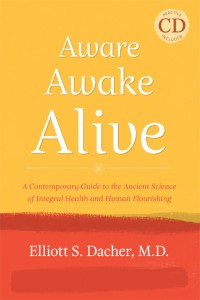 I’m still savoring Elliot Dacher‘s excellent new book, Aware, Awake, Alive. Obviously, I’m interested in the whole notion of Integral Health in general, and Dacher has perhaps done more than anyone to articulate just what an integral vision of health means, distinguishing an integral approach from both conventional medicine and complimentary/alternative (CAM) approaches. Here’s how Dacher puts it in Aware Awake Alive:
I’m still savoring Elliot Dacher‘s excellent new book, Aware, Awake, Alive. Obviously, I’m interested in the whole notion of Integral Health in general, and Dacher has perhaps done more than anyone to articulate just what an integral vision of health means, distinguishing an integral approach from both conventional medicine and complimentary/alternative (CAM) approaches. Here’s how Dacher puts it in Aware Awake Alive:
The word “integral” means unitary or one. It refers to a far-reaching health and well-being that addresses all of the important aspects of our lives. There are four components of an integral health. They correspond to the four central aspects of our life. The first two are highly personal — our physical and mental well-being. The second two relate to our interaction with others — our interpersonal relationships and our relationship to the larger culture and planetary community. […] A concern for each of these [interconnected] aspects of life is essential if we are to resist and recover from disease, optimize well-being and reach towards our full human potential.
Dacher points out that conventional medical science does indeed acknowledge the fact — supported by both research and common sense — that multiple factors impact our health. I can’t tell you how many times I’ve heard folks who embrace some vision of holistic health crow on about how modern medicine is completely ignorant of the well-established connections between physical, psychological and cultural aspects of health and illness. One need only talk to the medical professionals in one’s local area to be disabused of this simplistic notion. Certainly in my experience at least, the vast majority of healthcare professionals are quite aware of the complexities involved in maintaining health and treating illness. The problem, as Dacher describes it, is not the lack of information supporting a multidimensional view of health, but rather “that our singular focus on biology keeps us from implementing this knowledge.”
The main point that Dacher stresses again and again in the book, and the main thing that distinguishes an integral approach to health from both conventional and CAM approaches, is that inner development is both the basis for and the driving force toward the attainment of integral health. Most CAM approaches promote alternative remedies, treatments and therapies, which is fine as far as it diversifies and optimizes the toolkit that healthcare practitioners have at their disposal. However, what characterizes a truly integral approach is:
the turn inward and reliance on our inner capacities, rather than on remedies and therapies. The reliance is on ourselves rather than on practitioners. So [the important distinction is] between a variation on biological medicine, which merely increases our medical tool kit, and an authentic vision of integral health that results from inner development.
This vision of an integral health resulting from a focus on inner development is precisely what is described in detail in both Aware, Alive, Awake and in Dacher’s previous book, Integral Health. I highly recommend both of these books. Perhaps some day soon I’ll actually finish reading Aware, Alive, Awake in its entirety so that I can write a proper review!

